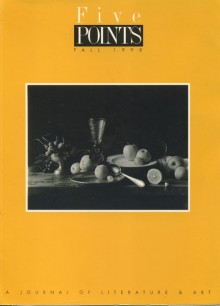Five Points, Vol. 3 No. 1
Fall 1998From Ellen Bryant Voigt: “We have a huge appetite for order; that’s part of the human animal. We love form of any kind. We just want it, and we want it to continue.”
Sample Content
Margot Livesey
The Third Servant
In the small Dutch village of Goes where my first lover grew up, the traditional dress for women is a short sleeved blouse which reveals the biceps, polished on special occasions with red wax until they shine like apples. If there is a Mount Olympus where the gods keep house, I like to think that Mnemosyne must be polishing her biceps vigorously these days, flashing them at such lowly beings as Aphrodite and Zeus and Pluto. Although her ambiguities and uncertainties are well documented, she has become an unquestioned good, in the forefront of court cases, books, conversations; even the vexed topic of repressed memory is only another aspect of homage. Meanwhile her dark sister, amnesia, is viewed with suspicion and fear: a harbinger of senility, evidence of trauma or, at the very least, a sign of transgression. That which we do not remember, we are doomed to repeat.
Here is something I do remember. In a pew near the front of the church, I swung my legs, too short to reach the floor, and listened to Mr. Chisolm, director of the Sunday school, expound on the parable of the talents. This was in the village of Denholm in the Borders of Scotland where we lived for five years. The church was built of the local grey granite and, in presiding spirit of John Knox, very plain; the only decorations were the memorial windows. Mr. Chisolm too was a man without adornment. His large face, from collarline to hairline, was a muted strawberry colour, ditto his large hands. He favoured a brown suit. He and his wife lived a few houses away from us and he ran a greengrocers. As a delivery boy, he told the Sunday school, he had carried a Bible in his pocket at all times; we should do the same.
Now he repeated the parable. A man, going into a far country, hands over his goods to his servants for safekeeping. He gives five talents to one servant, two to another, one to another. the first two servants trade and double their money; the third buries his single talent in the ground. When the master returns he applauds the first two and reproaches the third.
Thou wicked and slothful servant, thou knewest that I
reap where I sowed not, and gather where I have not
strawed….Take therefore the talents from him, and
give it unto him which hath ten talents. For unto every
one that hath shall be given, and he shall have abundance:
but from him that hath not shall be taken away
even that which he hath.
The talents, Mr. Chisolm explained, were God’s gifts to us which, as good Christians, we must use to our utmost. Failure to do so, he tut-tutted, was a sin. I don’t know how the other children felt, hearing he stern comments, but I yearned to defend the third servant. Was it really so wrong to hang on to what one had been given? Take care of what one had got?

